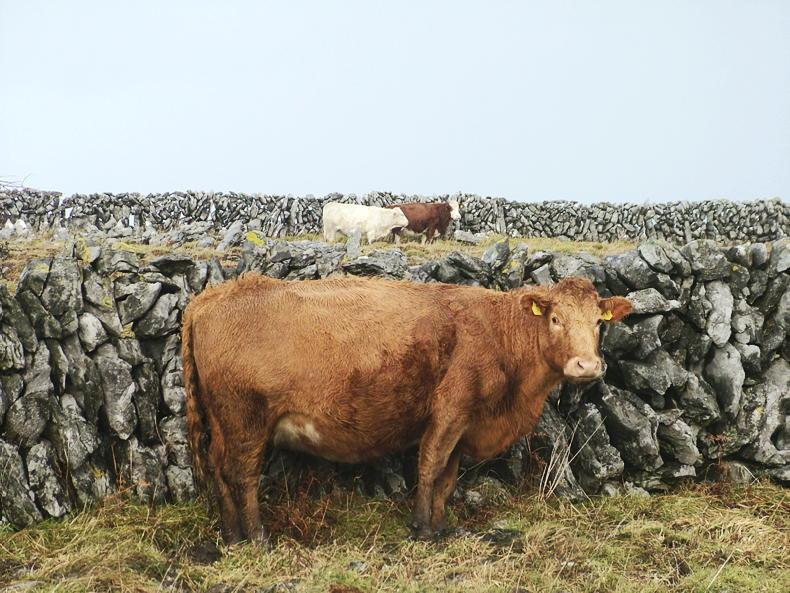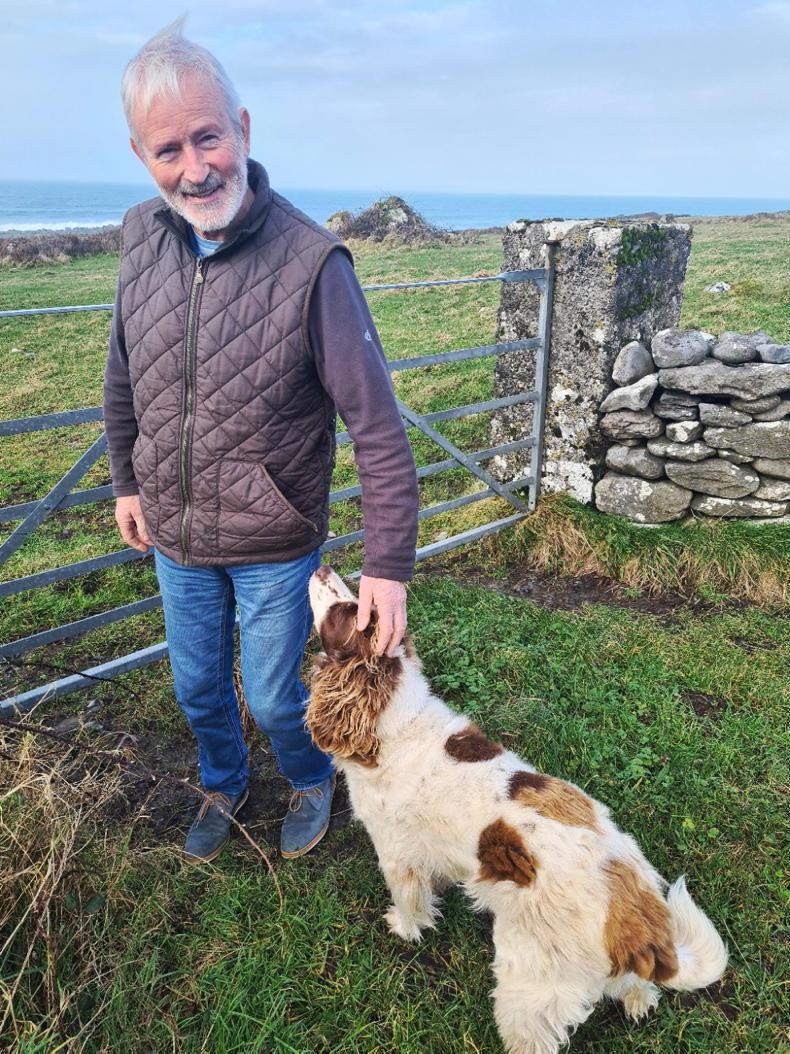Patsy Carrucan and his son, Kevin, farm 102ha in northwest Clare, a spectacularly situated holding overlooking the Aran Islands. Much of the land is rough grazing, used for outwintering their 40 mixed-breed suckler cows.
The weanlings are typically sold in autumn at local marts – healthy limestone cattle that command a good price.
Recently retired as a farm adviser, Patsy is now farming full-time; Kevin works off-farm but helps at weekends.
This change of circumstance seems to be suiting Patsy well: he is clearly enjoying his farming more than ever, busy catching up on jobs previously neglected due to work pressure, while also upgrading facilities (housing, etc) required for their recent conversion to organics.
The conversion has been carefully considered in terms of the necessary capital investments and adjustments to stock numbers – reduced by 10% to accommodate an anticipated 20% reduction in silage production.
Perhaps surprisingly, Patsy found that farming always paid better than his advisory practice. Explaining this, he cites very low farm costs (approximately 10% of income – mostly contractor costs for spreading fertiliser, slurry and saving silage: keeping machinery in this corrosive coastal environment isn’t easy – or wise) and increasing ‘scheme’ supports which he works to optimise.
The farming spectrum
Patsy has a long, strong attachment to his place. He grew up on the farm – which he traces back to his grandfather’s grandfather – with his six sisters, at a time when everything from milking 20 cows to spreading dung to pulping fodder beet was done manually.
Following school, he earned a degree in agricultural science, which led to 12 years working in the pig industry in Cavan – the other end of the farming spectrum. This proved a great education, and was also where he met his Longford-born wife, Anne, and where they began their family (Kevin and two girls, Lynn and Niamh, currently in Australia).
Returning home to take over the farm in the early 1990s – then suckler beef, as it remains today – Patsy drew on his education and experience to establish his own farm advisory business, seeing opportunities in the then emergent agri-environmental schemes.
Over three decades, he has seen many such schemes come and go, though he was glad to retire late last year – the growing workload, ‘trickier’ applications, shrinking timeframes and increasing levels of IT skills needed, accelerating his decision to step back.

Patsy outwinters his suckler herd, typically housing them for only six weeks, greatly reducing feed costs.
When asked about the relative merits of the various schemes, his main contention is that local, bespoke approaches work best to accommodate the very different farm environments and challenges across Ireland. They also stand a better chance of engaging farmers in “doing the right thing” for their local place rather than just “going through the motions” for some generic, national scheme.
Unprecedented change
As a farmer, Patsy reflects that no other generation has witnessed the scale of change he has seen in his lifetime. Such rapid change inevitably leads to unforeseen impacts – which in turn has necessitated environmental controls and supports.
Unfortunately, this has contributed to oppressive levels of paperwork, while onerous ‘penalty schedules’ have created fear even among compliant farmers.
This has led to growing reliance on overstretched advisers, which has further alienated many farmers from the purposes – and obligations – of the schemes for which they are being paid.
Patsy feels this is an ongoing Achilles’ heel in the effectiveness of such schemes.
While Patsy feels that farm advisers don’t lack the ability or motivation to do their work well, they do lack the time. Many colleagues have had to take on temporary staff to deal with often intense, fluctuating workloads and unrealistic timeframes – not a great solution for the staff member, or the farmer, who typically prefers continuity in terms of advisory support.
Patsy laments that better forward planning for scheme delivery seems never to be sufficiently considered.
A retirement – of sorts
Back on the farm, Patsy takes great pleasure and pride in herding his cattle – and occasionally those of his neighbours in this tight-knit community of Fanore.
Many neighbours work off-farm which he sees as a positive, economically and socially, but advises farmers not to kill themselves by overdoing it on both ends – keep the farm work as easily manageable and profitable as possible, he advises.
Patsy is a very thoughtful, measured man with vast experience in farming, widely respected for his community and advisory work.
Looking ahead, he would like to explore ways of adding value to farm outputs, potentially finishing some stock and selling them direct, capitalising on the spectacular landscape.
Certainly, the stock here enjoy an idyllic lifestyle – spending most of the year outdoors savouring Burren herbs and enjoying spectacular Atlantic views and fresh sea breezes – much like their owner and now, at last, full-time farmer, Patsy Carrucan.
Patsy advises that income and profit are two different things.
For many farmers, it’s ‘handed down’ that you’re ‘failing’ if you cut back but, while this may mean less income, it can result in more profit, less stress and greater resilience.
That’s been his experience, while recognising that every farm situation is different.
Over 900 farm advisers in Ireland are approved under the Farm Advisory Service (FAS), the aim of which is to ensure that advisers have the appropriate skills, knowledge and competency to provide suitable advice to farmers on a range of issues. More information on this system, and a full adviser list, are available here.
Name: Patsy and Kevin Carrucan.Farm type: suckler beef (weanlings).Farm size: 102ha.Focus: maximise profit by minimising costs, leave the farm in better condition.Schemes: Organic Farming Scheme (in conversion), ACRES C-operation Project.
Patsy Carrucan and his son, Kevin, farm 102ha in northwest Clare, a spectacularly situated holding overlooking the Aran Islands. Much of the land is rough grazing, used for outwintering their 40 mixed-breed suckler cows.
The weanlings are typically sold in autumn at local marts – healthy limestone cattle that command a good price.
Recently retired as a farm adviser, Patsy is now farming full-time; Kevin works off-farm but helps at weekends.
This change of circumstance seems to be suiting Patsy well: he is clearly enjoying his farming more than ever, busy catching up on jobs previously neglected due to work pressure, while also upgrading facilities (housing, etc) required for their recent conversion to organics.
The conversion has been carefully considered in terms of the necessary capital investments and adjustments to stock numbers – reduced by 10% to accommodate an anticipated 20% reduction in silage production.
Perhaps surprisingly, Patsy found that farming always paid better than his advisory practice. Explaining this, he cites very low farm costs (approximately 10% of income – mostly contractor costs for spreading fertiliser, slurry and saving silage: keeping machinery in this corrosive coastal environment isn’t easy – or wise) and increasing ‘scheme’ supports which he works to optimise.
The farming spectrum
Patsy has a long, strong attachment to his place. He grew up on the farm – which he traces back to his grandfather’s grandfather – with his six sisters, at a time when everything from milking 20 cows to spreading dung to pulping fodder beet was done manually.
Following school, he earned a degree in agricultural science, which led to 12 years working in the pig industry in Cavan – the other end of the farming spectrum. This proved a great education, and was also where he met his Longford-born wife, Anne, and where they began their family (Kevin and two girls, Lynn and Niamh, currently in Australia).
Returning home to take over the farm in the early 1990s – then suckler beef, as it remains today – Patsy drew on his education and experience to establish his own farm advisory business, seeing opportunities in the then emergent agri-environmental schemes.
Over three decades, he has seen many such schemes come and go, though he was glad to retire late last year – the growing workload, ‘trickier’ applications, shrinking timeframes and increasing levels of IT skills needed, accelerating his decision to step back.

Patsy outwinters his suckler herd, typically housing them for only six weeks, greatly reducing feed costs.
When asked about the relative merits of the various schemes, his main contention is that local, bespoke approaches work best to accommodate the very different farm environments and challenges across Ireland. They also stand a better chance of engaging farmers in “doing the right thing” for their local place rather than just “going through the motions” for some generic, national scheme.
Unprecedented change
As a farmer, Patsy reflects that no other generation has witnessed the scale of change he has seen in his lifetime. Such rapid change inevitably leads to unforeseen impacts – which in turn has necessitated environmental controls and supports.
Unfortunately, this has contributed to oppressive levels of paperwork, while onerous ‘penalty schedules’ have created fear even among compliant farmers.
This has led to growing reliance on overstretched advisers, which has further alienated many farmers from the purposes – and obligations – of the schemes for which they are being paid.
Patsy feels this is an ongoing Achilles’ heel in the effectiveness of such schemes.
While Patsy feels that farm advisers don’t lack the ability or motivation to do their work well, they do lack the time. Many colleagues have had to take on temporary staff to deal with often intense, fluctuating workloads and unrealistic timeframes – not a great solution for the staff member, or the farmer, who typically prefers continuity in terms of advisory support.
Patsy laments that better forward planning for scheme delivery seems never to be sufficiently considered.
A retirement – of sorts
Back on the farm, Patsy takes great pleasure and pride in herding his cattle – and occasionally those of his neighbours in this tight-knit community of Fanore.
Many neighbours work off-farm which he sees as a positive, economically and socially, but advises farmers not to kill themselves by overdoing it on both ends – keep the farm work as easily manageable and profitable as possible, he advises.
Patsy is a very thoughtful, measured man with vast experience in farming, widely respected for his community and advisory work.
Looking ahead, he would like to explore ways of adding value to farm outputs, potentially finishing some stock and selling them direct, capitalising on the spectacular landscape.
Certainly, the stock here enjoy an idyllic lifestyle – spending most of the year outdoors savouring Burren herbs and enjoying spectacular Atlantic views and fresh sea breezes – much like their owner and now, at last, full-time farmer, Patsy Carrucan.
Patsy advises that income and profit are two different things.
For many farmers, it’s ‘handed down’ that you’re ‘failing’ if you cut back but, while this may mean less income, it can result in more profit, less stress and greater resilience.
That’s been his experience, while recognising that every farm situation is different.
Over 900 farm advisers in Ireland are approved under the Farm Advisory Service (FAS), the aim of which is to ensure that advisers have the appropriate skills, knowledge and competency to provide suitable advice to farmers on a range of issues. More information on this system, and a full adviser list, are available here.
Name: Patsy and Kevin Carrucan.Farm type: suckler beef (weanlings).Farm size: 102ha.Focus: maximise profit by minimising costs, leave the farm in better condition.Schemes: Organic Farming Scheme (in conversion), ACRES C-operation Project. 






 This is a subscriber-only article
This is a subscriber-only article










SHARING OPTIONS: